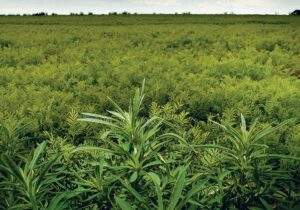
No other problem is as big as weeds for farmers because they take over the space, nutrients, water, and sunlight of other crops.
These unwanted plants bring in diseases and insects, make crop quality worse, and block drainage and irrigation systems. Worst of all, they spread weed seeds in the harvest and reduce crop yields.
To tackle this, farmers use several methods to fight weeds which are ploughing the land, using chemicals, removing by hand, or combining all the methods.
Ploughing is a bad idea as it can result into topsoil erosion by wind and water. Using excessive chemicals is also bad as it is harmful to wildlife and contaminates groundwater.
One solution that is effective against weeds is herbicide resistant crops. These plants are precisely developed keep weeds from affecting the yield. Most farmers choose an herbicide-tolerant crop which they use to remove weeds without harming the crops in the field. We will cover more about herbicide resistant crops in the below post.

Source: https://static.producer.com/wp-content/uploads/2022/03/09213501/54-4-col-MJR-spraying-Wilcox.jpg
What Are Herbicide Resistant Crops?
Herbicide-resistant plants can grow and flourish even when herbicides used to kill weeds are applied to the area. Farmers use these plants for weed control.
Every plant has a natural ability to tackle certain herbicides to some extent. Some plants, like canola, are genetically altered to be made resistant to herbicides. Scientists have created new plant varieties that won’t be harmed by a particular herbicide.
Herbicide-tolerant crops are not a new concept. Both farmers and scientists know that tolerance can be passed from one plant to another through crossbreeding in both wild plants and cultivated crops.
Scientists have been studying the transfer of herbicide tolerance for many years and discovering new things to help farmers.
Why Are Herbicide Resistant Crops Developed?
Herbicide-resistant crops were developed to help farmers deal with the weeds and stop them from affecting other crops. Weeds are a persistent problem as they are difficult to eliminate. They steal essential resources from other crops, affecting their yield.
When farmers plant a crop, they choose a plant that can withstand a specific herbicide, allowing them to use that herbicide in their fields. This way they can remove weeds from the fields without harming the other crops. The herbicide removes the weeds from the field, while the herbicide resistant plant remains unharmed.
Some farmers use herbicide resistant crops for environmental reasons as it allows them to use less harmful herbicides. It reduces the need for direct contact with the herbicide when spraying it on a field. This approach aligns with eco-friendly and sustainable farming practices.
How Are Herbicide Resistant Crops Developed?
Herbicide resistant crops have become a valuable tool in modern agriculture, offering farmers effective ways to combat weeds. These crops are created using two distinct methods.
The first method involves inserting a “foreign” gene from another organism into a crop. This process results in a genetically modified organism (GMO). Some examples of GMO herbicide resistant crops include varieties of soybeans, corn, and canola. These plants are resistant to herbicides like glufosinate and gluglyphosate.
The second method involves the regeneration of herbicide resistant mutants from existing crop germplasm. This approach produces non-GMO herbicide resistant hybrids or varieties. Some examples of non-GMO herbicide resistant crops are Clearfield corn, sulfonylurea-tolerant soybeans (STS), and wheat.
The agricultural industry is focused on developing new herbicide resistant crops. They have created newer varieties by incorporating multiple genes into a single variety or hybrid. This concept is called stacked traits or stacked genes. Certain cotton varieties and corn hybrids are genetically altered to possess foreign genes to be made resistant to herbicides and insects. Some new corn varieties boast multiple traits, offering more control options to farmers.
Technology development and progress in research help develop new varieties of herbicide-tolerant crops. These crops are beneficial for farmers as they manage weeds and enhance crop yields.
Benefits Of Herbicide-Resistant Crops
Planting herbicide resistant crops, particularly those resistant to glyphosate is beneficial for farmers. Some of those advantages are:

Source: https://static.producer.com/wp-content/uploads/2022/10/12172614/12_2-col_Kochia_in_lentils1246.jpg
Broader Spectrum Of Weeds Controlled
Crops that are resistant to non-selective herbicides like glufosinate and glyphosate can control a large variety of weeds. Glyphosate’s systemic activity controls perennial weeds and their vegetative structures, such as rhizomes and stolons. This broad-spectrum control is valuable in no-till farming systems and weed-infested fields.
Reduced Herbicide Carry-Over
Glufosinate and glyphosate exhibit no residual activity in the soil, binding tightly to organic particles. This characteristic results in fewer restrictions on planting and setbacks for subsequent crops. The flexibility provided by reduced soil carry-over helps farmers to explore a wider variety of rotation crops.
Reduced Crop Injury
Compared to traditional herbicides like chlorimuron and lactofen, both glufosinate and glyphosate cause minimal harm to crops. It reduces crop injury, especially for plants like soybeans.
New Mode of Action for Resistance Management
In integrated weed management (IWM) programs, glufosinate and glyphosate are used for controlling weeds. Weed is a serious problem for farmers, especially in Canadian and U.S. regions. Herbicide resistant crops play an important role in mitigating this problem.
Use of Environment-Friendly Herbicides
Glufosinate and glyphosate are less toxic to animals and humans compared to other herbicides. Their strong affinity for organic soil particles and rapid decomposition reduces the risk of groundwater contamination and leaching. It promotes a safer environment for both agricultural practices and wildlife.
Crop Management Simplicity and Flexibility
Herbicide resistant crop technology is user-friendly and requires minimal training or skills. Its flexibility and lack of major restrictions make it a suitable choice for producers. Herbicide-tolerant crops allow farmers to use herbicides for extended periods, controlling weeds efficiently. Poor weather conditions hinder the efficiency of selective herbicides.
Herbicide-tolerant crops are great for weed management practices and help farmers to protect their crops. It increases productivity and offers environmental benefits.
Final Words
Herbicide resistant crops are genetically modified and offer multiple benefits in modern agriculture. They provide a broader spectrum of weed control, reduce crop injury, and minimize herbicide carry-over, thus enhancing crop rotation flexibility. These special crops help farmers to control weeds even in poor weather conditions.
